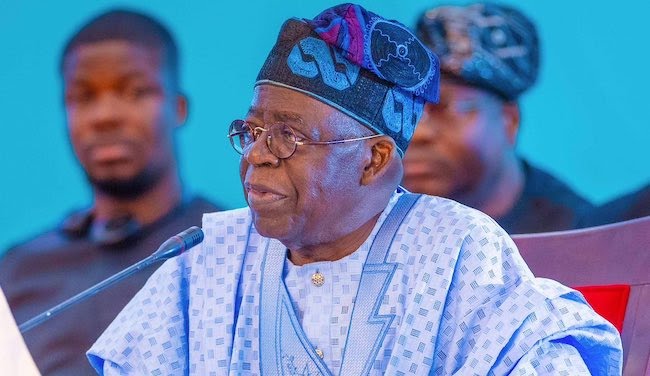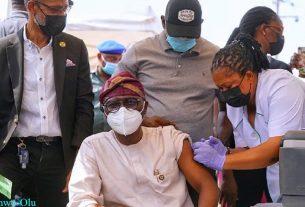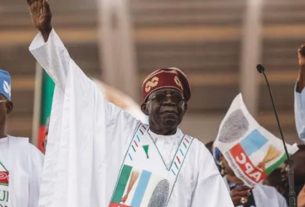- High-stakes parley may reshape 2027 path amid rising doubts over Shettima
- Wike’s growing influence unsettles party as defections reshape power base
- Okechukwu cautions against sidelining CPC bloc in leadership race
- Don’t repeat PDP’s arrogance, mistakes, South-South faction warns
Tomorrow’s National Executive Committee (NEC) meeting of the All Progressives Congress (APC) is set to be one of the party’s most politically charged gatherings since its formation, especially with the 2027 general elections approaching.
The NEC is expected to confront a host of contentious issues, including deepening internal divisions, zoning controversies, the influx of defectors, governance concerns, and a growing leadership crisis. The meeting, reportedly backed by the president, may play a pivotal role in shaping the party’s direction over the next 18 months.
There is no indication that the meeting will entertain a vote of confidence in President Bola Tinubu, to avoid provoking dissent or triggering a repeat of the Gombe State debacle.
Dominating discussions will likely be the sensitive issue of zoning for elective and appointive positions within the party, particularly as opposition forces mobilise to prevent President Tinubu from retaining the presidency in 2027.
There has been ongoing speculation about a plot to alter the composition of the 2027 presidential ticket, fuelling rumours that Vice President Kashim Shettima may be replaced.
The move to replace Shettima gained momentum following the last NEC meeting, which controversially zoned the office of the party’s national chairman to the North-West—away from the North-Central, which had traditionally held the position.
In what appears to be a hasty attempt to correct that perceived injustice, tomorrow’s NEC meeting was convened.
Also on the agenda is the ratification of the outcomes of state congresses and standing committees.
While those items are expected to dominate proceedings, party sources told The Guardian that President Tinubu, as the party leader, may also raise additional matters for discussion when the council is formally convened.
Among the issues the President is reportedly keeping close to his chest is a potential cabinet reshuffle, which could see some ministers removed to accommodate emerging political interests, especially in light of recent defections to the party.
As part of efforts to counter opposition coalitions and maintain a strong base, President Tinubu is reportedly intensifying consultations with political heavyweights, particularly in the North.
One such significant meeting was a recent private encounter with Kano political strongman, Rabiu Musa Kwankwaso, who is believed to be laying down preconditions for his possible return to the APC along with his influential Kwankwasiyya movement.
Although APC leaders have yet to publicly link Kwankwaso’s speculated return with the sudden resignation of former national chairman, Dr Abdullahi Umar Ganduje, signs suggest a strong connection between the two developments.
Ahead of tomorrow’s caucus and NEC meetings, party insiders say there is still uncertainty about who President Tinubu might endorse for the position of substantive national chairman.
While many party chieftains are unsure whether Kwankwaso would accept the role vacated by Ganduje, they acknowledge that the final decision rests with President Tinubu and the Hope Uzodimma-led Progressive Governors Forum (PGF).
Ganduje stepped down from the position last month, citing the need to take a break from active politics to address personal health issues. His exit has created a significant vacuum that could affect the party’s organisation and preparedness for upcoming by-elections, including gubernatorial polls in Anambra, Ekiti and Osun states.
Among the top agenda items for the Acting National Chairman, Ali Bukar Dalori, will be the ratification of the schedule for congresses and standing committees, as well as an update on the party’s e-registration process across the 36 states.
At the core of the lobbying for the national chairmanship is the debate over whether the position should remain in the North-West—Ganduje’s zone—where Kwankwaso, a former Kano State governor and 2023 presidential candidate of the New Nigerian Peoples Party (NNPP), is being considered as a possible successor.
However, other stakeholders are pressing for the seat to return to the North-Central, where it was zoned initially before the 2022 adjustment. They argue that returning it to the North-Central would ensure historical fairness and maintain internal party balance.
Chairmanship tussle
As the quiet tussle over the zoning of the APC national chairmanship slot reaches fever pitch, a foundation member of the party from the Congress for Progressives Change (CPC) bloc headed by the departed President Muhammadu Buhari, Mr Osita Okechukwu, appealed to President Bola Tinubu to use the powers of his office to nominate a foundation member of the party as national chairman. He argued that the nominee must understand the party’s origins and must have “suffered in opposition before the party’s registration in 2013” for NEC approval.
While noting that he is not a member of the APC NEC, Okechukwu stated that one of the key items for the meeting would be choosing a successor to the immediate past chairman, Umar Ganduje, and emphasised that the party needs to approve a broad-minded individual for the position.
He stressed that only a chairman with such qualities would “passionately and justly reconcile factions, in order to remedy all manner of despondency, which cost the party dearly in previous elections, especially in the South-East region.”
He stated: “The factions bedevilled APC’s electoral fortunes in previous elections in the South-East. Those who were aggravated either abstained from voting or voted against us.
“I am not an officer of the party, but a foundation member of the All Progressives Congress, South-East geopolitical zone, whose interest is the victory of President Bola Ahmed Tinubu in the 2027 presidential election.
“Secondly, we are also appealing for the nomination of a true progressive as chairman, who will adhere to the fine tenets of our progressive manifesto, constitution, and accordingly advise our governors and Mr President.
“Thirdly, the chairman should come from the North-Central in our zoning tradition and in the interest of justice, fairness and sense of belonging.”
Okechukwu underscored the need for reconciliation within the APC as the 2027 general elections approach. He lamented: “Is it not a paradox that those who blatantly undermined intra-party democracy, imposed party leadership at ward, local government areas and state level and scored the poorest result in the South-East for Mr President are the ones holding appointments?”
Speaking on the lack of proper recognition and reward mechanisms in the party, Okechukwu, a former Director-General of the Voice of Nigeria, said: “These are the same people who blocked reconciliation efforts made by the former chairman Senator Adamu Abdullahi, rendered the findings null and void and consigned them to the cupboard.
“Ironically, they captured the few appointments; whereas we paid dearly as the electorate punished our great party for crass impunity and abuse of internal party democracy, which office holders committed.”
He expressed confidence that “a true progressive, just and fair-minded chairman will reconcile factions, harvest APC’s numerical strength and spread. This way, you strengthen our great party and make the victory of APC at gubernatorial and presidential elections seamless in 2027 general elections.”
Checks show that the top contenders from the North-Central zone include former Nasarawa State governor and ex-CPC chairman, Senator Tanko Al-Makura; former Kogi State governor, Yahaya Bello; former Plateau State governor, Joshua Dariye; and the Minister of Poverty Alleviation and Humanitarian Affairs, Dr Nentawe Yilwatda.
Other prominent names in contention are Senators Sani Musa (Niger) and Salihu Mustapha (Kwara), both of whom are regarded as technocratic and less factional. Senator Abu Ibrahim from Katsina, a long-time ally of President Tinubu since their days in the National Assembly during the aborted Third Republic, is also reportedly under consideration, should the President decide to retain the chairmanship position in the North-West.
Supporters of Al-Makura have intensified their lobbying efforts, reminding the APC that the defunct Congress for Progressive Change, which he once chaired, played a crucial role in delivering the core northern votes that contributed to the APC’s victory in the 2015 general elections.
They argue that, since the Action Congress of Nigeria bloc has produced the President and dominates the executive, fairness demands that the CPC faction be compensated with the national chairmanship.
Al-Makura’s loyalists also highlight his consistent party loyalty and emphasis on unity. “It would be a win-win for the North-Central and the CPC legacy, which has been increasingly sidelined since 2023,” one party strategist said.
Meanwhile, the strongest momentum in recent weeks appears to be gathering around Senator Sani Musa of Niger State.
2027 Presidency and North-South power play
There is no doubt that considerations for the 2027 elections will shape deliberations at the meeting. While President Bola Tinubu has secured endorsements for a second term, powerful northern blocs within the party are quietly agitating for a return of power to the North.
Stakeholders from the North-West and North-East are reportedly proposing fresh zoning arrangements, while Tinubu loyalists in the South insist that the party must uphold the rotation principle to ensure his re-election bid.
Another flashpoint is the management of the ongoing wave of defections from the opposition Peoples Democratic Party (PDP), including key governors and lawmakers. The growing influence of Federal Capital Territory (FCT) Minister, Nyesom Wike, now seen as a southern powerbroker, has stirred unease within APC ranks. Long-time party loyalists fear a repeat of the 2014 episode, when defectors hijacked party structures at the expense of founding members.
States such as Bayelsa, Rivers, Benue, and Kano remain deeply factionalised, with disputes over control of party structures and federal recognition still unresolved. NEC members are expected to debate how to strike a balance between rewarding defectors and preserving the loyalty of long-standing party members.
State crises, discipline and reforms
Intra-party conflicts in Kano, Edo, Rivers, and Benue, ranging from parallel structures to unresolved court cases, have weakened party cohesion.
The NEC may consider disciplinary measures against senior members, including ministers and lawmakers, accused of anti-party activities during the 2023 general elections and recent off-cycle polls. Whether the party will enforce discipline or continue with selective tolerance remains uncertain.
Although the NEC is not a performance audit panel, discussions are expected to touch on the Tinubu administration’s midterm record, particularly in light of the economic hardship caused by the removal of fuel subsidies, naira devaluation, and inflation. Party insiders say there is mounting pressure to reposition the APC brand and governance style to avoid voter backlash in 2027.
A South-West party leader said the NEC must “speak truth to power” by demanding reforms that restore public trust, or risk electoral defeat. Similarly, a South-South stakeholder urged the party to avoid the “communication failure” that plagued the Jonathan administration in 2015.
Proposals are also on the table to establish a mechanism for evaluating the performance of federal and state appointees on the APC platform, along with a new communication and public engagement strategy. Many believe this is crucial to addressing growing public discontent.
The NEC is also expected to initiate internal reforms, which may include amending the APC constitution to address concerns over internal democracy, caretaker committees, consensus candidacies, and the concentration of power.
A critical outcome of the meeting may be the release of a timetable for congresses and conventions—from the ward to the national level—a move seen as essential to resolving leadership uncertainty ahead of the 2026 primaries.
The expected resignation or replacement of some national officers, including the unresolved issue of the successor to the former National Chairman, Umar Ganduje, is likely to be a prominent feature. While some anticipate that Tinubu will push for a loyalist, others say the presidency is acting cautiously to avoid backlash from a rushed appointment.
FCT Minister Nyesom Wike’s growing influence in the South-South and Abuja has unsettled several factions within the APC. His allies are reportedly lobbying for key positions in the convention planning committee and other party organs—an indication of ambitions that may stretch beyond 2027.
There is no official statement yet from the APC South-West zonal leadership. However, party sources say the zone is expected to present a united front in support of Tinubu’s second-term bid and push for a national chairman aligned with that objective.
The South-West bloc is also likely to demand increased resources and firmer commitments for upcoming state elections in Ekiti, Osun, and Oyo, while urging discipline and unity across party ranks in the region.
Thursday’s NEC meeting will be more than a routine gathering. It will test the APC’s capacity to hold together its sprawling coalition. With rival blocs vying for influence and the 2027 elections drawing near, how the party navigates zoning, defections, internal reforms, and leadership rifts may determine whether it retains its position as Nigeria’s dominant political force—or begins to unravel.
Efforts to reach Isaac Kekemeke, APC National Vice Chairman (South-West), were unsuccessful as he did not respond to calls or messages. Within the South-South zone, the recent defections of some governors to the APC, and speculations that more may follow will be part of dominant discussions at the NEC meeting. This is especially true regarding how this will impact the internal operations of the party in the affected states, including both old and new entrants.
This growing political realignment is expected to form part of the discussions at the party’s upcoming NEC. Efforts to get comments from key stakeholders in the region proved abortive. The APC Zonal Publicity Secretary for South-South, Mr Dave Okumgba, did not respond to calls or messages. Similarly, the Publicity Secretary of the Tony Okocha-led APC faction in Rivers State, Mr Chibuike Ikenga, was unreachable, while Mr Okocha himself also declined to respond to calls and texts.
However, Darlington Nwauju, Publicity Secretary of the Emeka Bekee-led faction of APC in Rivers State, told The Guardian that the ongoing convergence within the party was a mix of “strange bedfellows” and warned of the danger of internal sabotage.
He attributed the party’s internal tensions to deep-seated divisions. “The zone is almost an APC zone with the defection of some governors into the party,” Nwauju said. “But the APC must look inward to ensure it is not simply copying and pasting failed PDP strategies built on the arrogance of power.”
He continued: “The PDP’s undoing as a ruling party was its consistent violation of its constitution, emboldened by sheer arrogance. The APC must correct the injustice of stripping the North-Central of the national chairmanship position and handing it to the North-West. For the party to remain visible and viable, it must uphold justice for all zones and members.”
The Huardian





